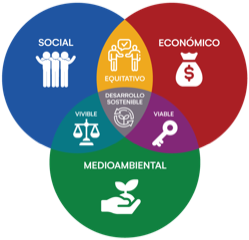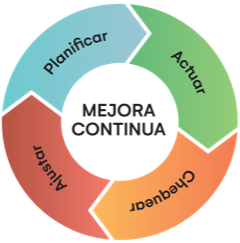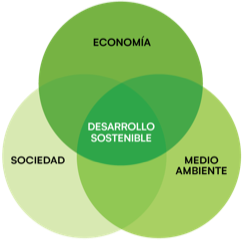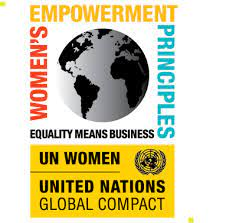We support environmental and social certification processes
Helping companies navigate the path to achieve its sustainable development goals.

PROCESSES IMPROVEMENT
Process analysis to determine the Sustainability Index
Processes analysis is a systematic evaluation of the sustainability of an organization, company or institution.

The assessment is carried out by collecting and analyzing data on the organization's processes, policies and practices, based on 5 pillars: Environment, Compliance, Customers and suppliers, Employees and Community.The results of the assessment are used to determine the organization's sustainability index, which is a measure of its performance in terms of sustainability.
PROCESSES IMPROVEMENT
Definition of areas for improvement
Defining areas for improvement is the process of identifying areas in which an organization, company or institution can improve their performance in terms of sustainability.
This process is based on the results of a process analysis, which provides information about the organization's strengths and weaknesses.
It comprises a review of the energy efficiency and the potential use of renewable energy in distributed generation projects.


PROCESSES IMPROVEMENT
Defining metrics for sustainable development
Defining metrics for sustainable development is the process of establishing indicators that allow measuring progress towards the Sustainable Development Goals (SDG).
Metrics must be relevant, reliable and comparable, and should provide useful information for decision making. THE GRI standard provides the appropriate conceptual framework for defining them.

CERTIFICATION
Preparing for B Certification
Preparation for the B certification is an important process for any organization that wants to demonstrate its commitment to sustainability.
The process begins with an assessment of the organization's processes, policies, and practices to identify areas for improvement. Once areas for improvement have been identified, the organization can develop an action plan to address them. The action plan should be specific, measurable, achievable, relevant, and timely. The organization should monitor its progress and make the necessary adjustments as needed.
With proper preparation, organizations can increase their chances to obtain B certification and demonstrate their commitment to sustainability.


CERTIFICATION
Preparing for WEP Certification
Sustainability is the new championship WEP certification, or Women's Empowerment Principles, is a certification program that recognizes organizations that commit to Promoting women's empowerment in the workplace. The WEP principles were developed by UN Women and the United Nations Global Compact.
WEP certified organizations commit to:

- Promote equal opportunities for women in the workplace.
- Eliminate discrimination against women in the workplace.
- Create a work environment that is respectful and inclusive for women.
- Promoting work-life balance for women
WEP certification is a way for organizations to demonstrate their commitment to women’s empowerment. Certification can help organizations attract and retain top talent, improve productivity and profitability, and meet the expectations of their stakeholders.
Here are some benefits of WEP certification:
- Attract and retain top talentWEP certified organizations are more attractive to employees who want to work in a workplace that is respectful and inclusive of women.
- Improve productivity and profitability:Organizations that empower women have a more productive and profitable workforce.
- Meet stakeholder expectationsWEP certified organizations meet the expectations of their stakeholders, including customers, communities and investors.
If your organization is committed to women's empowerment, WEP certification is a great way to demonstrate your commitment.
CONTACT
Write to us to learn more
DelPlata Green LLC
Coral Gables, FL 33134, United States.
